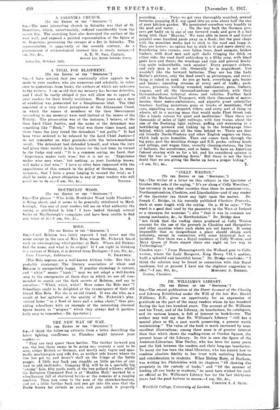THE NEW WAY OF WAR.
[To THE Earroa or rsa " Sescrsvon."]
SIR,—I think the following extracts from a letter describing the latest fighting conditions in Flanders might interest your eaders
" They are very queer these battles. The further forward you erg, the less there seems to be going on; scarcely a soul to be seen, either British or German, and mostly only vague and spas- modic machine-gun and rifle fire, as neither side knows where its line hen got to, and daren't shell on the fringe of the battle proper. A little way back you stumble on little parties of our men in odd shell-holes. Company H.Q. will be in a specially big ' cramp' hole, fifty yards south of the two pollard willows; whilst' the Battalion Command Post is at 'Haddon Hall,' marked by a wheelbarrow full of shattered bricks or the remains of a reaping machine. Then you come to the zone of the stretcher-bearers, and yet a little further back and yen get into the area that the Boobs knows for certain as ours, and you catch it properly according. . . . Twice we got very thoroughly marched, several batteries pumping H.E. top speed into an area about half the sine of your kitchen garden. We prostrated ourselves very humbly in the mud and water. . . . On the way back the German grin- ners got badly on to one of our forward roads and gave it a bad doing with their 'Heavies.' We were able to leave it and travel parallel some hundred yards away on a flank; but the poor chaps with the munition mules had to stick to the road and lump it. They are heroes: no option but to stick to it and move slowly on, floundering into craters, over fallen trees, dead animals, broken limbers, with dead men and spilt shells fringing the ditch on either side; the road itself ankle-deep in a filthy soup, with blood pools here and there; the wreckage and ruin and general desola- tion quite indescribable, such squalor! Every prospect sickens, and only man is not vile. Generally he is magnificent. You wouldn't like the forward batteries. They are 'too like Lady Butler's pictures, only the dead aren't so picturesque, and every- thing is caked in mud. As you go back, everything gets busier and busier; unending streams of every sort of traffic; pack- horses, prisoners, walking wounded, ambulances, guns, limbers, wagons, and all the thousand-and-one specialists with their• thousand-and-one technical stores and vehicles. Further back still is the Mechanical Transport, with their thousands of motor- lorries; their motor-ambulances, and gigantic great caterpillar tractors hauling monstrous guns or trucks of munitions, Staff care, signalling cars, despatch riders, and every sort of thing on wheels, all in a moving mass that would make Fleet Street look like a lonely retreat for quiet and meditation! Then there are thousands of miles of light railways, with tiny trains, about the also of the Feetiniog light railway, puffing and screaming in a bewildering network and linking up to the broad-gauge lines behind, which advance all the time behind us. There are dear old friendly North-Western and other English engines on them, which look quite homelike. Then one comes back through the big guns, past the munition dumps and R.E. parks, railway heads and sidings, and wagon lines, casualty clearing-stations, the line of balloons, the aerodromes, and so home. We have an American Colonel staying with us for a bit, and his considered opinion is that the war is 'something fierce.' But there is not the least doubt that we are giving the Boche up here a proper hiding."














































 Previous page
Previous page